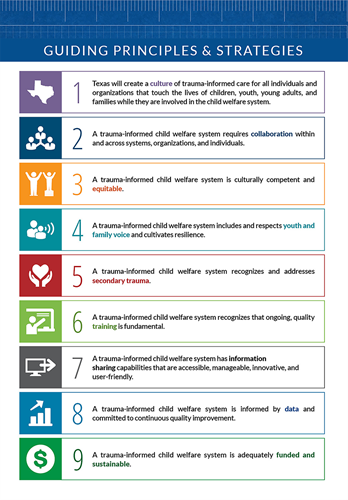Based on the work of the SCTIC, the Children’s Commission published Building a Trauma-Informed Child Welfare System: A Blueprint in February 2019. The Trauma Blueprint provides a roadmap for the child welfare system and invites innovation and improvement in both the public and private sectors to become trauma-informed and trauma-responsive.
Statewide Collaborative on Trauma-Informed Care
About the SCTIC
In July 2017, the Children’s Commission launched the Statewide Collaborative on Trauma-Informed Care (SCTIC) to elevate trauma-informed policy and practices in the Texas child welfare system by creating a statewide strategy to support system reform, organizational leadership, cross-systems collaboration, and community-led efforts with data-informed initiatives.
Guiding Principles of Implementation
The Blueprint focuses on nine Guiding Principles to create a trauma-informed child welfare system. These Guiding Principles and correlating strategies inform the work of the SCTIC Implementation Task Force, as well as provide principles for all interested stakeholders to center their trauma work around.

SCTIC Implementation Task Force and Workgroups
Chaired by the Honorable Judge Carlos Villalon, Judge of the Child Protection Court of the Rio Grande Valley West, the Implementation Task Force was created to oversee the implementation of the strategies set forth in the Blueprint. The Implementation Task Force set global priorities for the SCTIC, established workgroups to carry out these priorities, and monitored progress to help ensure successful implementation.
The workgroups Policy & Practice, Training, and Information Sharing, Data, & Funding each completed large projects during the initial phase of implementation.
For additional resources, please visit the Reports and Resources page, Statewide Collaborative on Trauma-Informed Care.
- TraumaInformedTexas.com
- 2021 Judicial Trauma Institute - The Judicial Trauma Institute was presented live on April 22-23, 2021 via webcast. The content was designed by Commission staff in partnership with the Statewide Collaborative on Trauma-Informed Care (SCTIC) Training Workgroup and hosted by the Texas Center for the Judiciary. The goal of the conference was for judicial teams to gain information and discover practical tools and resources about how to become a trauma-informed and trauma-responsive court in CPS cases. Video replays and conference materials can be accessed on the Judicial Trauma Institute webpage.
Trauma Informed Court Pilot Project
The SCTIC work continued under the guidance of an Implementation Task Force. Through a grant partnership with the Texas Center for Child and Family Studies, the SCTIC work focused on supporting four court sites to implement trauma-informed projects. Each court site had a lead judge who convened a court team made of key collaborative partners to implement projects with the goal of addressing child and family safety through a trauma-informed lens.
The pilot included court teams led by the following judges:
- Hon. Linda Dunson, Judge of the 309th Family District Court, Houston;
- Hon. Angela Graves-Harrington, Judge of the 246th Family District Court, Houston;
- Hon. Andrea James, Associate Judge of the Second Region Child Protection Court Number 2, Bryan; and
- Hon. Cheryl Vaughan, Associate Judge of the Child Protection Court Eighth Region North, Gainesville.
Using strategies from the Trauma Blueprint, the court teams developed a plan for their communities to prioritize felt safety for families and children, focus on effective courtroom culture, and build lasting community ties. Projects designed by these court teams include a monthly brown bag training series; phased service plans to support families in successfully completing services; a video for families explaining what to expect in the courtroom; and parent notebooks.
In collaboration with the Children’s Commission, the Texas Alliance of Child and Family Services (TACFS) published Building a Network of Trauma Informed Courts in Texas in March 2024 to highlight the work and the resources created by the Trauma-Informed Courts Pilot Project.
Consortium on Trauma Informed Court Practices
The Children’s Commission began the next phase of the work related to trauma informed care in August 2024, by launching a new initiative called the Consortium on Trauma Informed Court Practices. The Consortium provides a statewide network for judges to have a forum for discussion, education, and training.
Chaired by Hon. Carlos Villalon Jr., Judge of the Child Protection Court of the Rio Grande Valley West, the Consortium is guided by the four mentor judges who participated in the year-long pilot on Trauma-Informed Courts: Hon. Linda Dunson, Judge of the 309th Family District Court, Houston; Hon. Angela Graves-Harrington, Judge of the 246th Family District Court, Houston; Hon. Andrea James, Associate Judge of the Second Region Child Protection Court Number 2, Bryan; and Hon. Cheryl Vaughan, Associate Judge of the Child Protection Court Eighth Region North, Gainesville. Designed for judges hearing civil child welfare cases, the Consortium on Trauma Informed Court Practices meets bimonthly in a virtual forum. Meetings will offer information on trauma as well as promising practices for creating and sustaining a trauma informed and trauma responsive court in a safe, engaging space for judicial learning and leadership. CJE including ethics hours and Family Violence hours will be provided for some of these bimonthly meetings, and related resources will be shared.
For more information about the Consortium, as well as additional related resources for judges, please visit TraumaInformedTexas.com. For questions about the Consortium, please email ChildrensCommissionRSVP@txcourts.gov.
